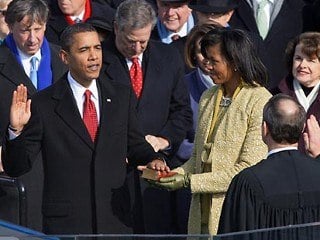Latest Gear Live Videos
Barack Obama’s Approval Rating Below 50 Percent

Posted by Dennis Velasco Categories: Domestic Policy, Editorials, Elections, History, US Economy, Wall Street,

After enjoying a 63% approval rating after his 100 days in office, President Barack Obama’s rating has dipped below 50% to 48% after his first 500 days in office. It’s been a tougher road for Obama as his tenure as president continued, especially with polarizing issues such as economic bailouts, offshore drilling, and the big one, healthcare. While the stock market has slowly recovered, people still find themselves unemployed and obviously dissatisfied with the rate of speed the president is turning this around. So, how does Obama compare to previous presidents?
George W. Bush’s approval rating stood 77 percent in late May 2002, just eight months after the September 11 attacks. Bill Clinton was at 51 percent in late May 1994. George H.W. Bush stood at 65 percent in May of 1990. Ronald Reagan’s approval rating was at 45 percent in May of 1982. Jimmy Carter stood at 43 percent in May of 1978 and Richard Nixon was at 59 percent in May of 1970.
Luckily Obama’s administration isn’t judged only after 500 days, but they will need to start to win back the people’s administration before they know it in order for a successful re-election in 2012.
Read More  | CNN Political Ticker
| CNN Political Ticker
Advertisement
Video: The Credit Crisis Simplified

Posted by Andru Edwards Categories: Business, US Economy, Videos, Wall Street,
I think we can all admit that the current credit crisis can be a bit difficult to understand and grasp by the average person. That’s why we like this video by Jonathan Jarvis, The Crisis of Credit Visualized. He breaks it down into plain English surprisingly well. Check it out, and let us know what you think in the comments.
You Cannot Multiply Wealth By Dividing It
Posted by Sal Traina Categories: Editorials, Taxes, US Economy,

How great does this quote by the late Baptist pastor, Adrian Rogers, relate to what our government is trying to do? I wish people weren’t so uninformed.
You cannot legislate the poor into freedom by legislating the wealthy out of freedom. What one person receives without working for, another person must work for without receiving. The government cannot give to anybody anything that the government does not first take from somebody else. When half of the people get the idea that they do not have to work because the other half is going to take care of them, and when the other half gets the idea that it does no good to work because somebody else is going to get what they work for, that my dear friend, is about the end of any nation.
Click to continue reading You Cannot Multiply Wealth By Dividing It
Obama’s Tax Plan Similar To 2001 Failed Plan
Posted by Sal Traina Categories: Editorials, History, US Economy,

After the terrorist attacks of Sept. 11, 2001, the US’s economy took a big hit. At the time, then President George Bush thought a stimulus(tax rebate) would help the economy recover. After two years of analysis, the government decided that their plan to “inject” money to the economy did nothing to help it’s condition. It didn’t help.
Click to continue reading Obama’s Tax Plan Similar To 2001 Failed Plan
Video: President Barack Obama’s Inaugural Address

Posted by Andru Edwards Categories: History, Site Features, US Economy, Videos, War,
If you happened to miss this mornings festivities, here’s your chance to watch President Barack Obama‘s inaugural address, in it’s entirety. President Obama gives a stirring speech on where he sees this country going, and what we all need to do to get there. You can also check out the full transcript of Obama’s address as well.
Read More  | TV Envy
| TV Envy
Barack Obama’s inaugural speech transcript

Posted by Andru Edwards Categories: Elections, History, US Economy, War,
 Barack Obama was sworn in on Tuesday, January 20, 2009, as the 44th president of the United States of America. He is also the country’s first (half) African-American president. He gave a stirring speech on this morning - here’s a transcript of that prepared speech:
Barack Obama was sworn in on Tuesday, January 20, 2009, as the 44th president of the United States of America. He is also the country’s first (half) African-American president. He gave a stirring speech on this morning - here’s a transcript of that prepared speech:
My fellow citizens:
I stand here today humbled by the task before us, grateful for the trust you have bestowed, mindful of the sacrifices borne by our ancestors. I thank President Bush for his service to our nation, as well as the generosity and cooperation he has shown throughout this transition.
Forty-four Americans have now taken the presidential oath. The words have been spoken during rising tides of prosperity and the still waters of peace. Yet, every so often, the oath is taken amidst gathering clouds and raging storms. At these moments, America has carried on not simply because of the skill or vision of those in high office, but because We the People have remained faithful to the ideals of our forebearers, and true to our founding documents.
So it has been. So it must be with this generation of Americans.
Click to continue reading Barack Obama’s inaugural speech transcript

The history of the word “bailout” is spotty at best. My handy not-quite-the-real-OED has no etymological definition. Merriam-Webster, who chose “bailout” as the word of 2008, gives a lame definition with a general reference to the year 1951:
Date: 1951
: a rescue from financial distress
So I went to the vast Google books resources and noticed that bailout in 1951 referred to pilots, bailing out of their cockpits [see also, Popular Mechanics in 1947 and 1956].
But what does that have to do with finance?
Click to continue reading Werd: Bailout - Part Five
Read More  | 2008 Word of the Year
| 2008 Word of the Year
Werd: Bailout - Part Four

Posted by Patrick Snajder Categories: Domestic Policy, Editorials, US Economy, Videos, Wall Street,

We’re bailing Thursday out with some videos. Sit back, listen, and we can explore inner and outer space together, forever.
“A working class hero is something to be.”
Click to continue reading Werd: Bailout - Part Four
Read More  | Hicks on America
| Hicks on America
Werd: Bailout - Part Three

Posted by Patrick Snajder Categories: Business, Domestic Policy, Editorials, US Economy,

So the much belabored point of Part Two was that, in my opinion, we all realize that a bailout is needed.
There are some dissenters that would argue that no taxpayer money should rescue financial organizations or our American auto makers. But anyone that seriously supports this philosophy is following the terrible advice that pushed us into the Great Depression:
Even today, with an economy much less dependent on bank loans than it was in 1930, a wholesale failure of the banking system, together with an extended fall in prices, could have a devastating impact. The reason most economists discount this possibility is that they don’t believe policymakers will make the same disastrous mistakes their predecessors made in the 1920s and 1930s, when the authorities stood by as the financial system imploded and withering deflation developed. [Full article here.]
The lesson learned from the Great Depression was that no government intervention at all is a sure-fire way to see the system collapse severely. There are many debates about what the government should specifically do, but all the debaters agree that doing nothing is the worst option of all. Nonetheless, many citizens seem to be opposed, in principle, to any bailouts at all that move taxpayer money towards rescuing banks or our automakers.
Click to continue reading Werd: Bailout - Part Three
Read More  | Portfolio's Economic Predictions for 2009
| Portfolio's Economic Predictions for 2009
Werd: Bailout - Part Two

Posted by Patrick Snajder Categories: Domestic Policy, Editorials, US Economy, Wall Street,

I am not a master of finance, to say the very least. [You can find my full opinion on debt and credit here.]
While 80% of the freshman when I was a senior at the University of Richmond in 2000 would go on to earn a major or minor degree from our Business School, I never took a single class at the School, and only ever held disdain for those that did.
It should be no coincidence, then, that almost ten years later, I am still buried underneath school loans and have seen my best entrepreneurial ideas die quick deaths due to my ignorance in all areas involving money. My relationship to the American economy, to this point, has been adversarial: we both cared little for one another and worked towards the other’s hopeful demise. But it is not with joy that I witness the economy’s current unhealthy state, as its disappointment only furthers a lesser state of my personal economy. If the current American economy were to die, a part of my life would surely die with it.
Click to continue reading Werd: Bailout - Part Two
Advertisement
© Gear Live Media, LLC. 2007 – User-posted content, unless source is quoted, is licensed under a Creative Commons Public Domain License. Gear Live graphics, logos, designs, page headers, button icons, videos, articles, blogs, forums, scripts and other service names are the trademarks of Gear Live Inc.

